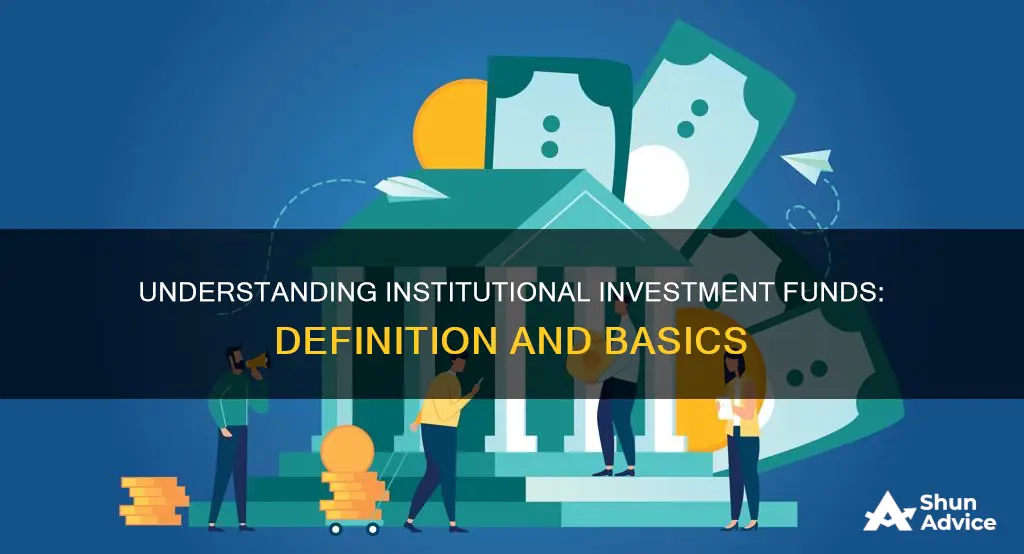
Institutional investment funds are investment vehicles that are only available to large institutional investors such as companies, charities, and governments. These funds create comprehensive portfolios for their clients, catering to varying market objectives and purposes, including educational endowments, nonprofit foundations, and retirement plans. Institutional investment funds are designed to meet the unique demands and needs of larger institutions, which differ significantly from those of smaller investors. As such, they have specific requirements, including large minimum investments.
| Characteristics | Values |
|---|---|
| Definition | A legal entity that pools money to purchase securities, real property, and other investment assets or originate loans |
| Types | Commercial banks, central banks, credit unions, government-linked companies, insurers, pension funds, sovereign wealth funds, charities, hedge funds, real estate investment trusts, investment advisors, endowments, mutual funds, investment banks, and more |
| Investor Type | Institutional investors are considered more sophisticated than retail investors and are subject to less regulatory oversight |
| Investment Size | Institutional investors are known to buy and sell in block trades of 10,000 shares or more |
| Investment Horizon | Institutional investors tend to have longer time horizons, allowing them to invest in illiquid assets that can generate higher returns |
| Investment Purpose | Institutional funds invest for a variety of purposes, including educational endowments, nonprofit foundations, and retirement plans |
| Investment Advantage | Institutional investors have access to a wider range of investment opportunities and instruments than private investors |
| Investment Influence | Institutional investors make up more than 90% of all stock trading activity and account for about 80% of the S&P 500 total market capitalization |
What You'll Learn
- Institutional investors are organisations that pool money to purchase securities
- They invest money on behalf of clients or members
- Institutional investors are considered more sophisticated than retail investors
- They are subject to less regulatory oversight than average investors
- Institutional investors include commercial banks, credit unions, and pension funds

Institutional investors are organisations that pool money to purchase securities
Institutional investors are companies or organisations that invest money on behalf of clients or members. They buy, sell and manage stocks, bonds and other investment securities. They are often referred to as the 'big fish' or 'whales' on Wall Street.
There are six types of institutional investors: endowment funds, commercial banks, mutual funds, hedge funds, pension funds, and insurance companies. They perform a high percentage of transactions on major exchanges and have a significant influence on the prices of securities. In fact, institutional investors make up more than 90% of all stock trading activity. They account for about 80% of the S&P 500 total market capitalisation.
Institutional investors have access to a variety of investment opportunities not open to retail investors. They have greater resources and specialised knowledge, and they can move markets with their large block trades. They are also able to access and explore a wider range of investment instruments than private investors.
International Index Funds: Smart Investment or Risky Gamble?
You may want to see also

They invest money on behalf of clients or members
Institutional investment funds are companies or organisations that invest money on behalf of clients or members. They are considered to be more sophisticated than the average investor and are often subject to less regulatory oversight. They include entities such as:
- Commercial banks
- Central banks
- Credit unions
- Government-linked companies
- Insurers
- Pension funds
- Sovereign wealth funds
- Charities
- Hedge funds
- Real estate investment trusts
- Investment advisors
- Endowments
- Mutual funds
These institutional investors are the 'big fish' on Wall Street, often buying and selling substantial blocks of stocks, bonds, or other securities. They are considered 'whales' due to their ability to move markets with their large block trades. They are also referred to as market makers, as they exert a large influence on the price dynamics of different financial instruments.
The presence of institutional investors in the market creates a positive effect on overall economic conditions. Their activism as shareholders is thought to improve corporate governance, as the monitoring of financial markets benefits all shareholders. They are also able to access and explore a variety of investment instruments not available to private investors.
Institutional investors are often exempt from certain securities laws and are entitled to preferential treatment and lower fees. This is because they are considered more qualified traders than individuals and are better able to protect themselves. They also have more money to invest and greater access to capital, which can result in them being billed less.
Institutional investors have a significant impact on the market and the companies they invest in. They control a large amount of all financial assets and their influence has grown over time.
Mutual Fund Investment: Strategies, Risks, and Rewards
You may want to see also

Institutional investors are considered more sophisticated than retail investors
Institutional investors are companies or organisations that invest money on behalf of clients, members, or shareholders. They are considered more sophisticated than retail investors due to their extensive resources, specialised knowledge, and ability to conduct thorough research on a wide range of investment opportunities. They are often subject to less regulatory oversight as they are assumed to be more knowledgeable and better able to protect themselves.
Institutional investors include entities such as pension funds, mutual funds, hedge funds, insurance companies, and endowment funds. They have access to large pools of capital, which grants them greater purchasing power and the ability to negotiate better fees. They also have the resources to conduct in-depth research and financial analysis when reviewing investment options. This includes investing in assets like commercial real estate, currencies, and futures.
The significant amount of capital that institutional investors manage, along with their frequent transactions, can result in substantial influence on the stock market. They are known for buying and selling large blocks of stocks, bonds, or other securities, often in quantities of 10,000 shares or more. This scale of trading can lead to sudden price movements and impact market sentiment.
Retail investors, on the other hand, are individuals who invest their own money, typically through brokerage firms or retirement accounts. They have smaller purchasing power and tend to invest in lower volumes, resulting in higher fees and commissions. While retail investors may have access to a wealth of information, their investment decisions are often driven by personal, life-event goals such as retirement planning or saving for education.
The differences in scale, resources, and investment strategies between institutional and retail investors contribute to the perception of institutional investors as more sophisticated. Their ability to influence markets and access exclusive investment opportunities further distinguishes them from retail investors.
Mutual Funds: Invest Now, Here's How
You may want to see also

They are subject to less regulatory oversight than average investors
Institutional investment funds are investment vehicles that are available only to large institutional investors. These funds are designed to meet the unique demands and needs of larger institutions, which often differ from those of smaller investors. They are often subject to less regulatory oversight than average investors, as they are considered more sophisticated and better able to protect themselves. Here's a more detailed explanation:
Less Regulatory Oversight
Institutional investors, such as hedge funds, mutual funds, and pension funds, are generally viewed as more sophisticated than the average retail investor. They have access to greater resources, specialised knowledge, and extensive research capabilities. This allows them to explore a wider range of investment opportunities that may not be accessible to individual investors. As a result, they are often subject to less restrictive regulations and protective rules.
Influence on Markets
Institutional investors are considered "market makers" due to their significant influence on market dynamics and prices of securities. They account for a large percentage of transactions on major exchanges and can create supply and demand imbalances with their large block trades. This influence has led to them being referred to as the "whales" or "big fish" of Wall Street. Their buying and selling activities can result in sudden price moves in stocks, bonds, and other assets.
Regulatory Exemptions
In certain jurisdictions, institutional investors may be exempt from specific securities laws or eligible for special investment opportunities. For example, in the United States, they can purchase private placements under Rule 506 of Regulation D as "accredited investors". Their large investment volumes and long-term investment horizons also grant them access to preferential treatment and lower fees.
Corporate Governance
The presence of institutional investors as shareholders can improve corporate governance. Their activism and monitoring of financial markets are believed to benefit all shareholders. Additionally, institutional investors can influence corporate behaviour and enforce better corporate governance practices due to their size and expertise.
Board of Trustees
Institutional investors often have a board of trustees responsible for managing their portfolios and selecting fund managers to invest on their behalf. This adds an extra layer of oversight and expertise to their investment decisions.
Invest in Fidelity: New Millennium Fund for Future Growth
You may want to see also

Institutional investors include commercial banks, credit unions, and pension funds
Institutional investment funds are investment vehicles that are available only to large institutional investors. They are companies or organisations that invest money on behalf of other people, such as clients, customers, members, or shareholders.
Credit unions are another type of institutional investor. Credit unions are organisations that pool together funds from multiple investors to invest in various financial instruments and profit from the process. They are considered more qualified traders than individuals and are thus better able to protect themselves.
Pension funds are the largest part of the institutional investment community and controlled more than $56 trillion in 2021. They receive payments from individuals and sponsors, either public or private, and promise to pay a retirement benefit in the future to the beneficiaries of the fund. Pension funds are often able to allocate a small portion of their portfolios to investments that are not easily accessible to retail investors, such as private equity and hedge funds.
ESG Funds: Smart Investment, Sustainable Future
You may want to see also
Frequently asked questions
An institutional investment fund is a collective investment vehicle available only to large institutional investors. These funds build comprehensive portfolios for their clients and can invest for a variety of purposes, including educational endowments, nonprofit foundations, and retirement plans.
Institutional investors are companies or organisations that invest money on behalf of other people. They include mutual funds, pensions, insurance companies, credit unions, banks, hedge funds, and endowments.
Institutional investment funds have access to a wider variety of investment opportunities than private investors. They are also considered more proficient at investing due to their professional nature and greater access to companies.







